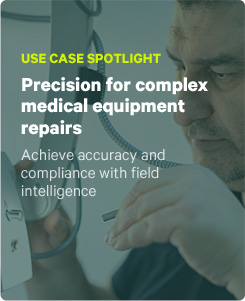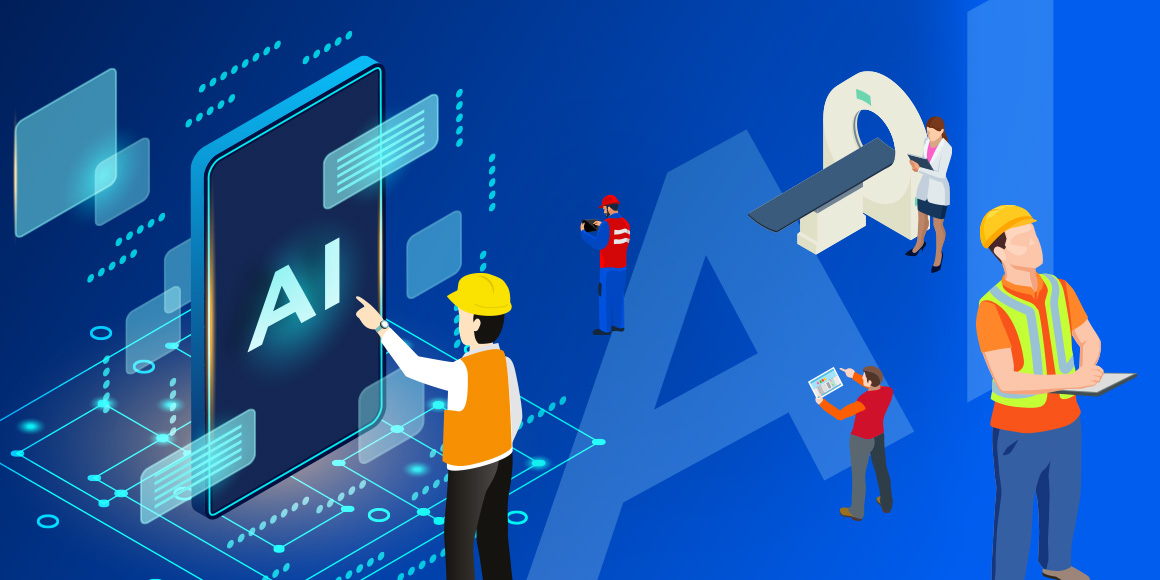AI is no longer a distant possibility in field service, it is a reality shaping operations, business possibilities, and customer experiences. However, adopting AI requires more than just integrating new technologies. It demands a fundamental shift in mindset by refining business processes to accommodate this new transformative technology. As highlighted in the Field Service AI Report, the evolution of these processes is critical to unlocking the true potential of artificial intelligence.
1. The Imperative for Process Evolution
AI is not a plug-and-play solution. 38% of respondents in the report indicated that evolving business processes is a priority in their AI strategy. This emphasizes the need for organizations to adapt their workflows, decision-making structures, and operational models to ensure AI can deliver maximum value.
For example, predictive maintenance, identified as a focus area for half of surveyed organizations, requires more than just adding machine learning models and hoping for the best. It involves redesigning maintenance schedules, training staff to interact with and interpret AI insights, and creating feedback loops for continuous improvement.
2. Overcoming Data Silos and Standardization Issues
One of the foundational challenges in AI adoption is the fragmentation of data across multiple systems. Poor data quality or insufficient data was cited as a barrier by 19% of respondents. To address this, organizations are faced with the challenge of refining their data collection and management processes.
AI systems rely on clean, standardized, and integrated data to provide accurate recommendations. This means breaking down silos, establishing consistent data formats, and investing in platforms that enable seamless data sharing across departments. TrueContext CEO Alvaro Pombo notes, “Seamless data flow is critical for AI to generate actionable insights.” This is a fundamental data governance issue upon which the utility of AI technology hinges.
3. Streamlining Workflow Integration
AI use cases, such as predictive scheduling and automation, often require adjustments to existing workflows. Predictive scheduling, which is relevant to 49% of respondents, optimizes technician assignments by considering variables like proximity, skill sets, and task urgency. To implement this effectively, organizations need to refine their scheduling processes and ensure alignment with AI-generated recommendations.
Similarly, automating routine tasks – identified as a priority by 50% of respondents – requires a clear understanding of which tasks can be automated and how those changes will affect overall workflows. For example, automating parts ordering might reduce administrative burdens but also necessitates updates to inventory management processes.
4. Training and Upskilling Staff
AI adoption introduces new tools and workflows, making staff training a critical component of process refinement. The report underscores the importance of equipping teams with the skills to leverage AI effectively.
Programs should look into training technicians, workflow designers, and ops leaders in interpreting AI-generated insights, integrating AI tools into daily workflows, and providing clear feedback to improve AI algorithms.
In addition, organizations may need to redesign roles and responsibilities to better align with AI-driven operations. For instance, technicians might take on more analytical tasks, while administrative staff might focus on having a more direct role in managing AI systems.
5. Incorporating Real-Time Feedback Loops
One of the challenges highlighted in the report is the poor quality of AI recommendations, with 61% of respondents citing inaccurate responses. This emphasizes the importance of feedback, especially from those with the expertise needed to continuously train AI models. To address this, organizations must incorporate real-time feedback into their processes.
“It’s not going to be perfect out of the box – but it can only get better with continued use. It’s the interactions between your technicians and your AI services that refine the technology for your specific application,” says TrueContext Chief Product Officer Glenn Chenier.
Technicians and managers play a key role in refining AI algorithms. By providing feedback on the relevance and accuracy of AI insights, they help systems learn and adapt. This requires creating efficient mechanisms for collecting and processing feedback without adding to the workload of frontline staff.
6. Aligning Process Changes with Strategic Goals
Refining processes is not just about making adjustments, it’s also about aligning those changes with broader strategic goals. The report reveals that 41% of organizations prioritize enhancing data analytics capabilities as part of their AI strategy. This focus on analytics underscores the need for processes that support data-driven decision-making.
For example, organizations aiming to improve customer satisfaction might refine their workflows to incorporate AI-driven customer insights. By integrating predictive analytics into service planning, they can proactively address customer needs and deliver a more personalized experience.
7. Addressing Organizational Resistance
While cultural resistance is less of a barrier than it once was, with only 14% of respondents reporting resistance as a challenge to adoption, it remains an important consideration. Process changes often meet resistance from employees who are hesitant to adopt new ways of working. Service organizations need to clearly communicate the benefits of AI processes, involve workers in the design and implementation of AI-enabled workflows, and highlight successful case studies to build employee trust.
8. Partnering with Experts
The complexity of process refinement often necessitates external expertise. Whether through hiring consultants or partnering with AI vendors, organizations can gain valuable insights into best practices for integrating AI into their operations.
For instance, third-party experts can help identify inefficiencies in existing workflows, recommend targeted process changes, and provide training on AI tools. This collaborative approach ensures that process changes are both strategic and effective.
The adoption of AI in field service is as much about evolving business processes as it is about implementing new technologies. From data management and workflow integration to training and feedback loops, refining processes is essential for unlocking AI’s full potential.
As organizations continue to invest in AI, those that proactively address process refinement will be best positioned to capitalize on its benefits. By aligning workflows with AI capabilities and fostering a culture of continuous improvement, field leaders can drive efficiency, enhance customer satisfaction, and future-proof their operations.





